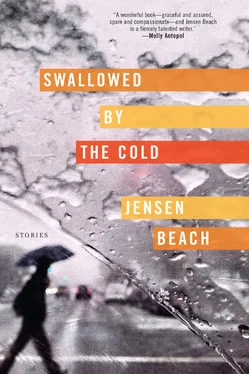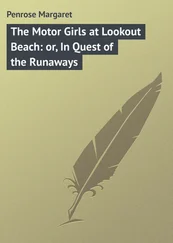The woman looks at Marie and it occurs to Marie that the woman does not know that Marie has also been told about Ahmed’s death, and also that she may assume that Marie was referring to the newspaper and the wind and the paper’s current place on the wooden bench. “I’m sorry?” the woman says.
“Ahmed,” Marie says, “the man who owns the shop. He died.”
“Right,” the woman says. Marie feels her disappointment in the woman’s lack of sadness plainly in her chest. It’s a hollow feeling, not physical exactly, but tightly woven inside her body. “I was sorry to hear that. Do you know how he died?”
Marie hesitates, brightens at the opportunity of the woman’s question. “Heart attack,” she says a little too hopefully, and takes a step closer to the woman.
“That’s terrible,” the woman says. “He can’t have been very old.”
“To God belongs what he has taken,” says Marie.
“I suppose,” says the woman, blinking. “I guess I don’t know what that means.”
Marie picks up the woman’s newspaper and puts it in her purse. She does this loudly, deliberately. The woman looks at her. “I’ve seen you,” Marie says. She feels her face flush with embarrassment but cannot control herself.
“I beg your pardon,” the woman says.
“With your mother,” Marie says. “I’ve seen you with your mother. That woman. Is that your mother?” Once, when Marie was a child, she pinched her sister as hard as she could until her sister began to cry.
The woman looks at Marie with a strange expression, turns her body to face Marie, and says, “My aunt, actually.”
“She looks like you,” Marie says. “Or you her, rather.”
The woman stares at Marie. In the woman’s face Marie can see as clearly as if the woman has spoken the words out loud that the woman is scared of her. Marie smiles at the woman and turns away from her. This is the polite thing to do, she thinks, the proper thing.
A man pushing a baby carriage is pacing back and forth along the platform. He has passed twice already. The baby is crying and the man is obviously nervous about this. He stops, not far from Marie, and puts a hand in the carriage, firmly rocking the baby side to side. “Shhhh,” he says. “There’s nothing wrong, be quiet.” The baby is not crying loudly, and with the wind and the murmur of conversation and the static of the approaching train it is hardly possible to hear the baby at all.
I
Thailand had become a little boring. He couldn’t admit this to Jenny. She loved the heat. She loved the little bungalow they’d rented. She loved all of it and insisted, every year, that they come to Thailand in July, the worst month, Jacob was certain, to visit such places. The bungalow was cramped with musty air whenever the tall wooden slat blinds were closed, which is how his daughters liked it and so how it was, and Jacob’s allergies had been acting up for the past few days. They’d been there a week, had a week to go, and Jacob hadn’t slept well yet. He and Jenny had to share the bedroom with the girls. He resented this for two reasons in particular. One, he and Jenny hadn’t had sex as much as he would have liked nor as much as he’d expected. Early in the trip they’d tried in the shower, when the girls were on the beach, and Jenny strained a muscle in her back and had to stay in bed for an entire day. Two, he snored. The girls made fun of him for this and their teasing hurt his feelings. It shouldn’t have but it did. He tried hard to laugh with his daughters when they laughed at him every morning, pushed close up against one another with their breakfast at the little unstable dining table, but he couldn’t. It hurt him.
One morning, fresh cup of coffee in his hand, Jacob was sitting in the rickety folding chair, which he had moved close to the sliding glass door overlooking the patio and little swatch of beach, when a koel landed on the patio railing. The sun reflected brightly off the white sand. The koel was a pretty bird, brown with white spots and bright crimson eyes. There was a storm coming in. He watched the clouds gather tall and dark out over the water. He’d read about the birds in a book on native flora and fauna. There weren’t many books in English, and none in Swedish, on the bungalow’s shelves. He’d read in the book that the koel was loud during mating season, March through August. The females produced shrill calls the book described as distinctive and spectacular. The bird stayed on the railing for eleven minutes. He timed it. He watched the waves and the bird and listened for its call, hoping to hear a sound he’d never experienced, but the bird just flew off.
After one afternoon of rain, they’d had sun for the rest of the stay. On the last day, he stood out on the beach, watching the waves punch the sand in uneven sets. Jenny and the girls were inside packing. They were waiting for the taxi to take them to the ferry that would take them back to the mainland and the airport. The sun had just come up and already it was hot. He listened to the waves, rubbed his hands over his arms, and felt the salt. It was beautiful, but he was done with it.
In Dubai, on the long layover, Kristina, their eleven-year-old, tripped and fell on the tile floor near the arrival gate. She bruised her knee severely and Jacob held her in his lap for over an hour as she cried. At first she cried deep, racking sobs that caused passersby to smile sympathetically, then short choppy intakes of breath that were barely audible. By the time they’d reached Arlanda, they were tired and sore and, though it was raining and he had to be at his office in fewer than eight hours, Jacob was relieved to be home.
II
Summer was when it really started. At the end of July, just after they’d come back from Thailand, Jenny was on her way home from a fiftieth birthday party Jacob hadn’t attended. It was late and the freeway was empty apart from the trucks speeding north out to the islands and coastal towns. From a long way off, she saw the faint wash of headlights shining up and out onto the road. As she got closer, she saw that a car had overturned in the shallow ditch beside the road. She put her hazard lights on and pulled as far onto the shoulder as she could get without driving her car into the ditch. She called for an ambulance. It was a chilly night. As quickly as she could, she made her way down the gravel embankment. The driver, whose name she would later learn was Henrik Brandt, had been badly injured. There were no passengers. Henrik was buckled to the driver’s seat. His hair brushed against the center ceiling lamp. The bones of his left arm had broken clean through the skin. They were chalky white and moist with blood. She felt her stomach turn. Saliva filled her mouth and she retched. The food from the party, the single glass of wine she’d allowed herself. She sat on the cold gravel beside the car and talked through the broken windshield. A radio program on North Korea had been playing when she came across the accident. She told Henrik about the program. He went in and out of consciousness as she spoke. The car was positioned toward the road and the headlights shone upward, over the lip of the ditch and out onto the road. Dust particles were charged static in the light. She told him about the birthday party she’d come from. It was for her friend Pernilla, whom very few people liked. She told him about Thailand and the bungalow they rented there every summer. It was on a beautiful island, the name of which she’d only just learned to pronounce properly. She told him she was having a difficult time trying not to be disappointed by the cool weather at home. She told him she liked ordering curry dishes so spicy she could not eat them. Beyond the car, a tall chain-link fence stretched left and right as far as she could see, parallel to the road. A leafy forest of birch shuddered at the fence line. She heard something in the forest and looked toward the noise in time to see the two glowing circles of a deer’s eyes disappear into the darkness. She heard the sirens of the ambulance and saw faintly the flashing red and blue lights coming north from the city. The sirens approached and she went up to the road to meet them. She stood on the shoulder, looking down at Henrik’s car as the paramedics examined him. They cut him loose from the seat belt and put him on a stretcher and placed him in the ambulance. Immediately, the ambulance rushed away. Jenny got in her car and waited. She sat and watched the tow-truck drivers, who had arrived not long after the ambulance departed, lift Henrik’s car out of the ditch with a crane and load it on a flatbed truck. Then a policeman told her to go home, and she did.
Читать дальше











